- Home
- Edward Cline
SH05_Revolution Page 20
SH05_Revolution Read online
Page 20
On a little table at his side were another lantern, a pewter mug of coffee — he had long since abandoned the custom of drinking that beverage and tea from a bowl — and a book he had selected from his library. He had not yet opened it, his own copy of Blackstone’s digest of his Vinerian lectures, which he wanted to peruse to find an answer to a question that had occurred to him over supper tonight, but could not now summon up the interest.
He was waiting.
An hour passed. He listened as the floor clock in the library chimed eleven.
Then, shortly after the last chime, he heard the sound he had expected to hear, the opening of one of the porch doors. He did not rise, but glanced in that direction, knowing what he would see.
Reverdy appeared, her arm partly outstretched with a silver candleholder. She stepped onto the porch and gently closed the door behind her. She faced him and smiled. Hugh smiled in answer, and gestured to another chair on the other side of the table.
He noticed that she wore her traveling cloak, and beneath it only a chemise. She had unpinned her black hair, which rippled down over her shoulders. She sat in the extra chair and put the candleholder on the table.
He asked, “Could you not sleep?”
She smiled. “No. I napped too long this afternoon, although it seems I only half slept. And I have difficulty resting in a strange place, until I am accustomed to it.”
“Would you like some tea, or coffee? Mrs. Vere always leaves a pot of one or the other in the kitchen for me. I keep such irregular hours after staff have bid me good night.”
“No, thank you.”
He reached over and touched her cloak. He could see her form faintly beneath the light material. “You are quite shameless, Reverdy. You have donned a camisado, to better beguile me.”
“Excuse me?’
“A camisado was a kind of tunic that knights once wore over their armor.”
“I do not intend to conquer you, Hugh.” She paused. “Nor defend myself.”
“Perhaps not. But you are making an effective sally, nonetheless.”
She looked away in defiance. “The servant or maid you assigned to me looked so peaceful sleeping that I hadn’t the heart to waken her to help me dress again.”
“Dilch?” Hugh had drafted the woman from the former slave quarter to wait on the Brunes, and had arranged to have an officer’s cot he had bought from Ramshaw years ago put in the hallway for her outside Reverdy’s door.
“Yes. Dilch.” A moment passed. Reverdy asked, “Have you forgiven me?”
“The matter is past forgiveness, Reverdy.”
“I did not understand your last letter to me, not until after a year with Alex. But by then, it was too late. You said some cruel things in that letter, but, in time, they became true.” Reverdy sighed. “He was a kind and gentle man, Hugh. Not like you at all, of course. I grew fond of him.”
Hugh nodded. “But never to love him.” He hoped that he had managed to keep the harshness of unbidden jealousy out of his words. He had wanted to say, “In spite of his being those things.”
Reverdy nodded her head once in concession to the statement that was not a question.
“Was it your mother’s decision, or your own, to marry him?”
Reverdy imagined he had asked, “Whose decision was it to reject me?” After a moment, she said, “A little of both.” She paused. “Mother never did approve of you. To her, you were not common enough to be respectable. Or, perhaps, not respectable enough to be common. You often scandalized her by the things you said and did.”
“I know.”
“Your arrest in London made up her mind.”
“Did it yours?”
Reverdy bowed her head and stared at her lap. “Yes,” she whispered. “I had always been frightened of you. And, at the same time…thrilled…”
“Which are you now?”
“A little of both,” answered Reverdy. “No. Less frightened, and more…thrilled.…”
Hugh smiled. “You must know that I am worse than you knew me, when last we met.” He paused. “This country coaxes the man out of oneself, if one exists to be coaxed. Completes the circle, so to speak. It demands more of him, or rather something that is not required of him in England, or not solicited there. I know that had I remained in England, I would be only half of what I am now. Yet I am still the same man you knew.” He chuckled. “The same man I knew.”
Reverdy grinned. “If I didn’t know you better, Hugh, I would charge you with a vain offense of English manhood.”
Hugh shook his head. “Do you know me better?”
“I know that had you remained in England, you would still be formidable, half of what you are now, or whole, and in jeopardy because of it.”
“Or about to be tried for treason or seditious libel, or already in prison for it.”
“When Alex and I were in Paris, we attended many of the salons, and at one of them James spoke with the Prussian ambassador. That man told him that he disapproved of all the talk and speculation that is the rage there, much of it that questioned the monarchy. He said to James, ‘Argue all you wish, but obey.’”
Hugh scoffed in amusement. “Sounds rather like the summary advice of a philosopher-tyrant, than of an ambassador. And, if that is King Frederick’s policy, I imagine that Mr. Voltaire regrets having dubbed him ‘the Great.’” Hugh looked at her. “What prompted you to relate that anecdote?”
“You, Hugh. I don’t see you fitting into any of the places I’ve seen. You are too much of a man.”
“Virginia tolerates me.” Hugh paused, then asked, “Are you making love to me, Reverdy?”
“I confess that I am. I didn’t know how I would feel when I saw you again. I didn’t expect to see you ever again. Or that you would ever want to see me again. And there you were, staring at me through the window of that inn in Hampton, so soon after we arrived. Then you rode off. I own that I felt slighted.”
Hugh smiled. “I was just as startled to see you. Was it your idea to come here?”
“Yes. It fitted James’s plans.”
“How did you know where I had settled?”
“Your mother wrote me about you,” said Reverdy. “It was a courteous note, with nothing recriminating in it. I am ashamed to say that I did not answer her.”
Hugh turned in his chair to face her directly. “When you agreed to join your brother on the voyage here, did you hope to find me?”
After a long moment, she whispered, “Yes.”
Hugh smiled. “Say it to me.”
“I hoped to find you, and break my connection with Alex.” Reverdy paused. “The voyage was rigorous, almost a kind of penance for…having abandoned you.”
“Why, Reverdy?”
The woman gazed at him, and then at the sky. “For as long as I’ve known you, Hugh, you have been a kind of Polaris to me, a North Star,” she said, nodding upward, “around which all other stars and matters revolve. When I meet other men, and somehow without my even knowing it, I always compare them with you. I even looked at Alex that way, when he would do something, or say something, and I’d ask myself, almost against my will: Would Hugh have done that, or said that? But I persuaded myself that I was not being fair to him, and that he deserved a different measure.” She smiled meekly. “I could forget you, for a while, but never what you were. Sometimes I cursed that measure. I think I called it, in my last letter to you, a ‘cargo of virtues.’ It would intrude on my estimates of those other men. It was an annoying intrusion, until I realized that it was an indelible measure…and right.”
She remembered her last letter, as well, thought Hugh. He sighed once, reached over and took one of her hands, then raised it to his lips. He let her hand linger for a moment, then returned it. “Reverdy, I think you should retire now. We will talk tomorrow. I shall show you and James Meum Hall, and take you both around for introductions.”
“All right.” Reverdy rose and picked up the candleholder. “Good night, Hugh.” She made to turn, then
paused. “Alex and I took a grand tour of the Continent, after we were married. Or, rather, a short tour of it. Paris, Vienna, Rome, Venice, and Naples. We were gone only a year. Alex was also busy there meeting merchants and correspondents for his firm, as well. I must tell you about the things we saw, and the people we met, and the things we heard.”
“I would like that. I have yet to set foot on the Continent. I have only my adventures on this one to relate.”
After a pause, she smiled down at him. “You won’t mind hearing about my travels with Alex?”
Hugh shook his head once. “No. Not now.”
“Well, good night. Hugh.”
“Good night, Reverdy.”
He watched her glide away, then open the porch door and disappear inside. The door closed with a soft click of the latch. He listened to her faint steps as she went up the stairs to her room. When he could hear no more, he turned in his chair again and listened to the night. In his thoughts were questions he could not now answer: Had his first love returned? Or had an enemy? Or a stranger? He could not decide which question required an answer.
He knew only that he was elated. He was her north, and always had been. Etáin had bestowed the same rank, so long ago, it seemed, on another man. On Jack Frake, his dearest friend. Reverdy would meet them both tomorrow, he thought, and he wondered whether or not they would think they had much in common.
But he was her north. He felt vindicated for having predicted the justice that would someday punish her. And punishment was the last thing he ever wished to visit on her.
* * *
Inevitably, the inhabitants of Caxton expressed curiosity about Meum Hall’s visitors. Mid-morning the next day, as Hugh consulted in his library with Mr. Beecroft and William Settle about the day’s tasks before he devoted time to “entertaining” his guests, emissaries arrived with invitations to dinner and supper at Enderly, Granby Hall, and Otway’s place. Reece Vishonn even proposed a ball. Hugh replied to all the invitations, citing available dates for suppers. He took the time to write Vishonn a brief note of thanks for the honor, declining a ball but relenting to a supper with other guests. When he was finished with those social chores, he donned his “field clothes” — pants, cotton shirt, and straw hat — and took Reverdy and James Brune on a walking tour of the fields, the cooperage area, the brickyard, and the tenant quarter. His visitors were fascinated with the bamboo conduit that Hugh’s tenants were still dismantling and carefully storing in a shed near the quarter. “Quite ingenious,” remarked James Brune. “That, and the tower there, and the water running from it into the house.”
“The conduit has saved me crops, time, and has reduced wastage.”
“I suppose other planters have copied your idea,” remarked James Brune.
“Some have tried, those who have a stream adjacent to their properties. But, even so, the idea is not adaptable to all fields. Mine has the advantage of a slope, so that the water flows without much effort. My friend, Jack Frake, dug a kind of canal from the stream there to solve his watering problems. I am certain he will want to show you it.”
He turned to smile at Reverdy and found her staring at him with more fascination than she had shown for the plantation. Her expression was one of perplexed amusement, as though she were trying to reconcile the intellectual, gentleman, and burgess and his library with the smells, mundane concerns and tasks, and brute labor required to salvage, maintain, and wrest a pound of profit from the earth and the plantation that sat atop it. And in her glance he saw a glimmer of admiration. But he turned to her brother and, with a wave that included the fields they had just traversed, asked in jest, “Still interested in trying your hand here, James?”
James Brune laughed and shook his head. “At this? Gads, no! The merchant’s trade for me, ever more, thank you very much, sir!”
When they returned to the great house later in the morning, James Brune elected to take an afternoon nap. “I am afraid our hike has tired me just a bit. May I borrow a book from your library, Hugh?” he asked. “Reading helps put me to sleep.”
But Hugh discerned the man’s true motive, that James sensed that his sister and host wished to have some time together, alone. “Help yourself, James,” he said, waving a hand in the direction of the library. “But, I must warn you: There are no dull books in my library.”
James Brune laughed. “I will have you know that any book will put me to sleep, even my own memoirs, if I had enough ambition to write them! I owe many of my slumbers to Mr. Milton’s Paradise Lost.”
Reverdy grinned. “Which took him nearly a year to read, on that account.”
James Brune took his leave and headed for Hugh’s library. Reverdy and Hugh remained on the porch. Mrs. Vere, ever alert to her employer’s and guests’ ease, appeared then, and asked Hugh if he required anything. “Tea, Mrs. Vere,” answered Hugh. “It is nearly time for it anyway.”
Reverdy and Hugh sat in the chairs they had used the night before. She asked, nodding to his work clothes, “Do you dress like that for every guest, Hugh?”
“No,” answered Hugh, “only when guests arrive without notice.”
“I am having trouble seeing you that way, and remembering your library.”
“Then let me help you end your trouble.” He turned their conversation to literature and music. Reverdy had read Sterne’s Tristram Shandy, and Fielding’s Tom Jones, and asked Hugh what he thought of those and other recent novels.
“I gave up trying to read Mr. Sterne’s opus,” said Hugh. “It is a monstrously confusing work. And Mr. Fielding’s novel is but a bawdy, picaroonish tale, passing for a morality play.” He paused. “There are some promising writers about, but nothing I have read to date has surpassed Hyperborea. I do not think anything ever will.”
“I have not yet read that,” replied Reverdy, sounding doubtful.
“I have two copies of the novel. You will have the opportunity to read it.”
“In Paris, we attended the Opéra-Comique, and heard Sophie Arnould sing in Rameau’s Les Indes galantes, an opera-ballet. That was quite a treat! And she has lived quite a fulsome life, as well! We heard that when she tired of her last lover, she sent everything he had ever given her to his wife — jewels, carriage, and even her two children! And that wife was the daughter of a powerful minister at court, and with her father she made such a fuss about all those dubious treasures that appeared on her doorstep, that the luckless fellow was obliged to depart for South America! Why, that story was nearly as entertaining as the opera itself!”
Hugh smiled tentatively. “It certainly has the ring of a modern farce. Perhaps, with the right libretto, it could serve as a comic opera, the French managing their stage better than they do their wars.”
Reverdy laughed. “Hugh, you are awful!”
They were silent for a while. Then Reverdy announced, with almost childlike enthusiasm, “I can sing! Dare me to name you the parts of an orchestra!”
Hugh turned to her, stunned. “Sing?”
Reverdy put on an expression of mock offense. “Yes. I have been taking lessons from an Italian instructor, Silvio Berlusconi, in London. He has coached many of the best opera singers.”
“I should like to hear you some time.”
“You shall. I was quite honest with Signore Berlusconi when he accepted me as a student. I told him that my goal was not Covent Garden or Drury Lane, but my own drawing room. I still take lessons from him, when I think my voice has grown lazy.” Reverdy paused, pleased to see the look of surprise on Hugh’s face. “In London, Alex and I gave occasional concerts, with hired musicians. One evening, at our guests’ urging, I sang all the lyrics for Rameau’s The Paladins. It was a great success.”
Hugh laughed. “If you are that good, expect to be invited to perform at one of Mr. Vishonn’s balls, or perhaps even be invited to the Governor’s Palace. Mr. Fauquier holds frequent concerts there, especially when the General Assembly is sitting. He plays the violin, viola, and cello, as well, and often joins with
other musicians. He is quite good.”
“I hope we can attend one. James and I saw the Governor’s residence the day we stopped in Williamsburg. It is grander than any English county seat.”
“Of course it is. It is the seat of a dominion, not of a mere county. Of a virtual country, in fact. But there is to be no General Assembly, this fall. The Governor prorogued it until spring of next year, over the Stamp Act Resolves. Still, he may announce a concert.” Hugh looked mischievous. “Name the parts of an orchestra.”
Reverdy put on an impudent smile. “There are three principal parts: the winds, the strings, and the percussion. In the winds, clarinets, bassoons, and oboes work with flutes, horns, and trumpets for counterpoint. Of the strings, basses, violins, and violas are strategically placed in the pit. Of the percussion, drums and timpani provide rhythm and accent to a score. A harpsichord or pianoforte may either lead, accompany, or comment on a composition.”
Hugh regarded Reverdy with newfound respect. “When did you decide that you wanted to sing?”
“I think the notion came to me when you took me to an opera in London.”
“I remember how thrilled you were.” Hugh smiled. “And with Vivaldi’s ‘Echo Concerto.’”
Reverdy said, “Yes,” then added, “Alex and I spent a week in Vienna. We attended a performance of Gluck’s Orfeo et Eurdice. Gluck himself conducted the orchestra. I think that is my favorite opera. But in Paris, we accompanied one of Alex’s French correspondents to the home of Minister Choiseul, which was a marvelous place. We attended a concert in his Octagon Room, which contains his favorite paintings. That room is lit by a glass dome, the better to appreciate his collection.”
“Marvelous idea, that glass dome,” said Hugh. “I’m sure that a hundred thousand Paris shopkeepers and country peasants were happy to have contributed so many sous in tax to its cost.”
“There you go, talking politics again!”

 Revolution
Revolution SH05_Revolution
SH05_Revolution War
War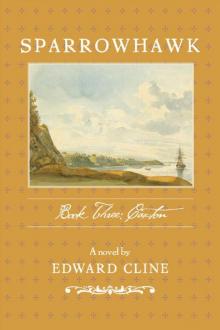 SH03_Sparrowhawk: Caxton
SH03_Sparrowhawk: Caxton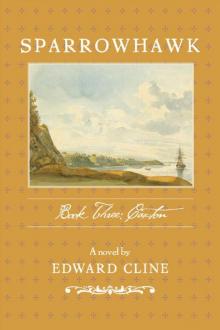 Sparrowhawk III
Sparrowhawk III Jack Frake
Jack Frake SH04_Empire
SH04_Empire Empire
Empire SH01_Jack Frake
SH01_Jack Frake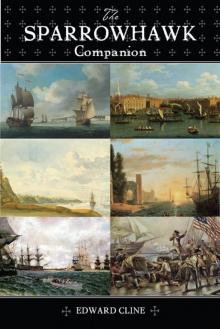 The Sparrowhawk Companion
The Sparrowhawk Companion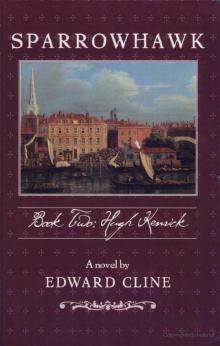 Hugh Kenrick
Hugh Kenrick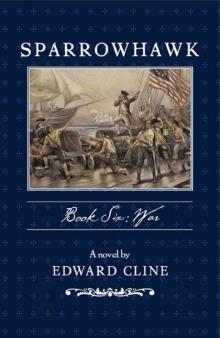 SH06_War
SH06_War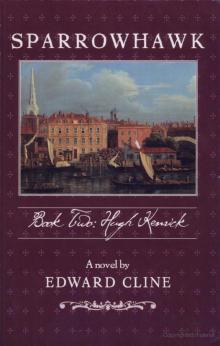 SH02_Hugh Kenrick
SH02_Hugh Kenrick